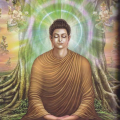How to practise
 Rixh
Australia New
Rixh
Australia New
I really don't know what I should be writing but am keen for some answers.
I have been practising meditation pretty much daily along with the occasional yoga for about six years now and am very appreciative with what the journey has brought me. I've just become a bit stuck lately. My main source of practise is mindfulness of breathing which consist of me following the breath on the tip of my nose for a set amount of time. Though I am a bit confused and have read in books that practising to much concentration meditation can send you astray. I sometimes also practise guided mediations such as loving kindness due to the fact I have a hard time remembering the meditations without the guide and have this thing in my head that it has to be exactly practised as it is guided. I feel stuck I mean is it OK to keep practising a majority of mindful breathing meditation or am I leading myself astray? What other methods should I be integrating within my practise? I feel myself slightly losing interest at times because I don't fully understand what path I should be on. I really want to get to the point where I can just sit and practise without guidance the meditation that is most appropriate at the time. I really do enjoy my practise though I feel like there is so much more potential to uncover. If anyone knows a method or path in which I may take in order to further my progress towards this enlightenment we seek? Thankyou


Comments
There is an analogy that was used by the Buddha in reference to how one should concentrate while meditating, which was like the strings on a musical instrument. String them too tight and the instrument sounds harsh, string them too loose and the instrument loses its melodiousness.
Generally I have found that when the impulse to meditate slackens, it is a good idea to change ones method a bit. For example a few years ago I switched from vipassana style “watching the belly rising and falling with the breath” to shikantaza “just sitting”, and that really helped me.
Everyone gets stuck. It is just your teacher saying that the rewards you have received so far from your practice are in fact the next source of attachments in need of being addressed.
This boundary is one of many lines drawn in the sand by our ego, identity or the selfish self, that says continuing beyond this point in it's own deconstruction will result in irrevocable changes. Here, many seek solutions elsewhere, and with much perseverance, only arrive back in front of another representation of that same drawn line in the sand.
That can mean a lot of circular wanderings on the path towards suffering's cessation when all their spiritual compass was actually requiring was a fuller acceptance of where they presently are.
possibilities:
Hope you find a change of focus
Hey Rixh, I think you're asking the right questions. Reading your post reveals someone ardent and mindful who's intent on discovering and understanding those answers. Adding on to the well-said above, if your goal is progress toward enlightenment and you've found yourself stuck, revisiting some of the original teachings may shake something free. There is great wisdom in the sutras which are the source of many dharma talks and guided meditations we enjoy and follow.
If you are keen on guided meditations, I may recommend audiobooks of the Tipitaka such as "In the Buddha's Words" by Bhikkhu Bodhi and narrated by Fajer Al-Kaisi. Fajer has a way of speaking the content of this book that just sinks in for me. Maybe it does so for others too.
If you are losing interest due to exploring on your own, there are lecture and meditation groups around which might provide some motivation and support. thebuddhistsociety.org provides a welcoming and learned environment for some group participation and I highly recommend it from my brief experience.
I find the exploration important to identifying the way and as you can see there is a lot to explore. Happy journeys.
If anyone knows a method or path in which I may take in order to further my progress towards this enlightenment we seek?
One way is to understand what the Buddha was pointing to in his teachings. You do this by reading or listening to Dhamma talks with full attention and open, curious, investigative mind.
Associating with the wise is the most important factor in my opinion.
Āvaraṇanīvaraṇa Sutta (SN 46.38)
38 (8) WITHOUT HINDRANCES (CDB p 1592)
“When, bhikkhus, a noble disciple listens to the Dhamma
with eager ears, attending to it as a matter of vital
concern, directing his whole mind to it, on that occasion
the five hindrances are not present in him; on
that occasion the seven factors of enlightenment go to
fulfilment by development.”
“Sāriputta, this is said: ‘A factor for stream-entry
(sotāpattiyaṅgaṃ), a factor for stream-entry.’ What
now, Sāriputta, is a factor for stream-entry?”
“Association with superior persons (sappurisasaṃ-sevo), venerable sir, is a factor for stream-entry.
Hearing the true Dhamma (saddhammassavanaṃ) is a factor
for stream-entry.
Careful attention (yonisomanasikāro) is a factor for stream-entry.
Practice in accordance with the Dhamma (dhammānudhammappaṭipatti) is a
factor for stream-entry.”
Yes really for meditation being part of a group and occasionally consulting with a meditation teacher can be very beneficial as well, it’s highly recommended. You could also try a retreat to see how you like a more intense meditation experience.
I've heard that going on a retreat can help open stuck doors, help you see new paths and deepen your understanding.
Any suggestions on how to pick one? I've never been and have some interest.
@Rixh;
You're getting a lot out of your journey so far but feel stuck. That's normal and you may be limiting yourself if you don't take the next step, whatever that step may be. That's a bit different than leading yourself astray but can sure feel that way.
I would echo everyone else who've commented so far. Learning to let go of the attachment to expectation, studying the suttas more, adding different forms of meditation, finding a physical branch of the Sangha, going on a retreat... Any of these can be a game changer.
When I get stuck, I look to the 8-fold path, see what needs improving and work from there. Should I plan a job change to line up with a beneficial livelihood? Is my intention skillful? Am I clinging to my views and hindering my growth? Do I need to practice how to focus and/or what to focus on?
Sometimes, what's missing in practice is the action that puts it to use. Once there is skillful resolve, things start to fall into place a bit more gracefully.
I'm not the most experienced myself.
It partially depends on your financial situation, many retreats cost a decent amount. That's not necessarily a bad thing, there are building costs, teacher costs, meals, etc. The insight meditation society has several.
There are also many free Theravada retreat centers around the US, I imagine other parts of the world too, that survive off of donations and volunteers. I remember browsing through an online resource several years ago that had places and dates you could reserve a spot at, generally backed up several months before and opening.
Sanghas I've been involved with have offered cheap or free retreats, usually only advertised to members.
I think in general look for established retreats and if you're new to them having an experienced teacher present is a good idea. Difficulties can arise the longer the retreat is.
@Rixh
Your questions are more likely to result in a balanced practice than an imbalanced one.
A daily meditation practice in its self for the last 6 years shows some serious persistence.
What had you choose one form of meditation over another?
Is the meditation form that you've currently settled upon specifically promoted by a particular teacher, lineage, or school? ..and do they have retreats?
Retreats tend to differ from our daily practice for how they specifically teach us how to continue practicing where we'd more commonly allow life's distractions to divert us from such efforts.
But, whether in daily practice or in a retreat, is there anywhere else but within this one fleeting moment where we can do either?
Different schools of Buddhism have different rules, methods or approaches to practice.
Key to all - open mind, open heart, seeking mind.
Peace to all